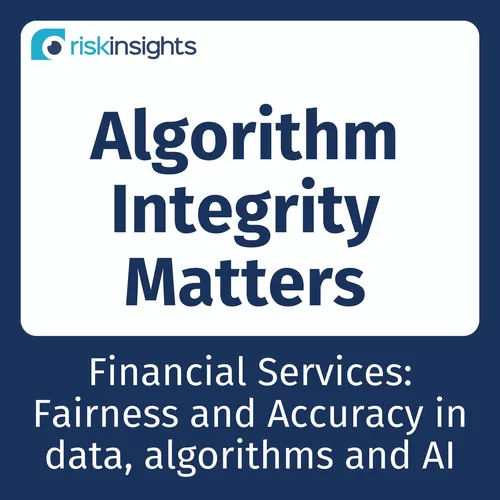
Algorithm Integrity Matters: for Financial Services leaders, to enhance fairness and accuracy in data processing
Insights for financial services leaders who want to enhance fairness and accuracy in their use of data, algorithms, and AI.
Each episode explores challenges and solutions related to algorithmic integrity, including discussions on navigating independent audits.
The goal of this podcast is to give leaders the knowledge they need to ensure their data practices benefit customers and other stakeholders, reducing the potential for harm and upholding industry standards.
- Update frequency
- every 6 days
- Average duration
- 11 minutes
- Episodes
- 27
- Years Active
- 2024 - 2025

Article 23. Algorithmic System Integrity: Testing
Spoken by a human version of this article.
TL;DR (TL;DL?)
- Testing is a core basic step for algorithmic integrity.
- Testing involves various stages, from developer self-checks to UAT. Where these happen w…

Article 22. Algorithm Integrity: Third party assurance
Spoken by a human version of this article.
One question that comes up often is “How do we obtain assurance about third party products or services?”
Depending on the nature of the relationship, and what…

Guest 3. Shea Brown, Founder and CEO of BABL AI
Navigating AI Audits with Dr. Shea Brown
Dr. Shea Brown is Founder and CEO of BABL AI
BABL specializes in auditing and certifying AI systems, consulting on responsible AI practices, and offering onlin…

Article 21. AI Risk Training: Role-based tailoring
Spoken by a human version of this article.
AI literacy is growing in importance (e.g., EU AI Act, IAIS).
AI literacy needs vary across roles.
Even "AI professionals" need AI Risk training.
Links
- EU AI Act…

Guest 2. Patrick Sullivan: VP of Strategy and Innovation at A-LIGN
Navigating AI Governance and Compliance
Patrick Sullivan is Vice President of Strategy and Innovation at A-LIGN and an expert in cybersecurity and AI compliance with over 25 years of experience.
Patri…

Guest 1. Ryan Carrier: Executive Director of ForHumanity
Mitigating AI Risks
Ryan Carrier is founder and executive director of ForHumanity, a non-profit focused on mitigating the risks associated with AI, autonomous, and algorithmic systems.
With 25 years …

Article 20. Algorithm Reviews: Public vs Private Reports
Spoken (by a human) version of this article.
- Public AI audit reports aren't universally required; they mainly apply to high-risk applications and/or specific jurisdictions.
- The push for transparency pr…

Article 19. Algorithmic System Reviews: Substantive vs. Controls Testing
Spoken by a human version of this article.
- Knowing the basics of substantive testing vs. controls testing can help you determine if the review will meet your needs.
- Substantive testing directly identif…

Article 18. Algorithm Integrity: Training and Awareness
Spoken by a human version of this article.
Ongoing education helps everyone understand their role in responsibly developing and using algorithmic systems.
Regulators and standard-setting bodies emphasi…

Article 17. Algorithm Integrity: Audit vs Review
Spoken by a human version of this article.
The terminology – “audit” vs “review” - is important, but clarity about deliverables is more important when commissioning algorithm integrity assessments.
Aud…

Article 16. Algorithmic System Accuracy Reviews – Choosing the Right Approach
Spoken (by a human) version of this article.
- Outcome-focused accuracy reviews directly verify results, offering more robust assurance than process-focused methods.
- This approach can catch translation e…

Article 15. Algorithm Integrity Documentation - Getting Started
Spoken (by a human) version of this article.
Documentation makes it easier to consistently maintain algorithm integrity.
This is well known.
But there are lots of types of documents to prepare, and ofte…

Article 14. External data - use with care
Spoken (by a human) version of this article.
Banks and insurers are increasingly using external data; using them beyond their intended purpose can be risky (e.g. discriminatory).
Emerging regulations a…

Article 13. Bridging the purpose-risk gap: Customer-first algorithmic risk assessments
Spoken (by a human) version of this article.
Banks and insurers sometimes lose sight of their customer-centric purpose when assessing AI/algorithm risks, focusing instead on regular business risks and…

Article 12. Risk-Focused Principles for Change Control in Algorithmic Systems
Spoken (by a human) version of this article.
With algorithmic systems, an change can trigger a cascade of unintended consequences, potentially compromising fairness, accountability, and public trust.
S…

Article 11. Deprovisioning User Access to Maintain Algorithm Integrity
Spoken (by a human) version of this article.
The integrity of algorithmic systems goes beyond accuracy and fairness.
In Episode 4, we outlined 10 key aspects of algorithm integrity.
Number 5 in that lis…

Article 10. Fairness reviews: identifying essential attributes
Spoken (by a human) version of this article.
When we're checking for fairness in our algorithmic systems (incl. processes, models, rules), we often ask:
What are the personal characteristics or attribu…

Article 9. Algorithmic Integrity: Don't wait for legislation
Spoken (by a human) version of this article.
Legislation isn't the silver bullet for algorithmic integrity.
Are they useful? Sure. They help provide clarity and can reduce ambiguity. And once a law i…

Article 8. A Balanced Focus on New and Established Algorithms
Spoken (by a human) version of this article.
Even in discussions among AI governance professionals, there seems to be a silent “gen” before AI.
With rapid progress - or rather prominence – of generativ…

Article 7. Postcodes: Hidden Proxies for Protected Attributes
Spoken (by a human) version of this article.
In a previous article, we discussed algorithmic fairness, and how seemingly neutral data points can become proxies for protected attributes.
In this article…